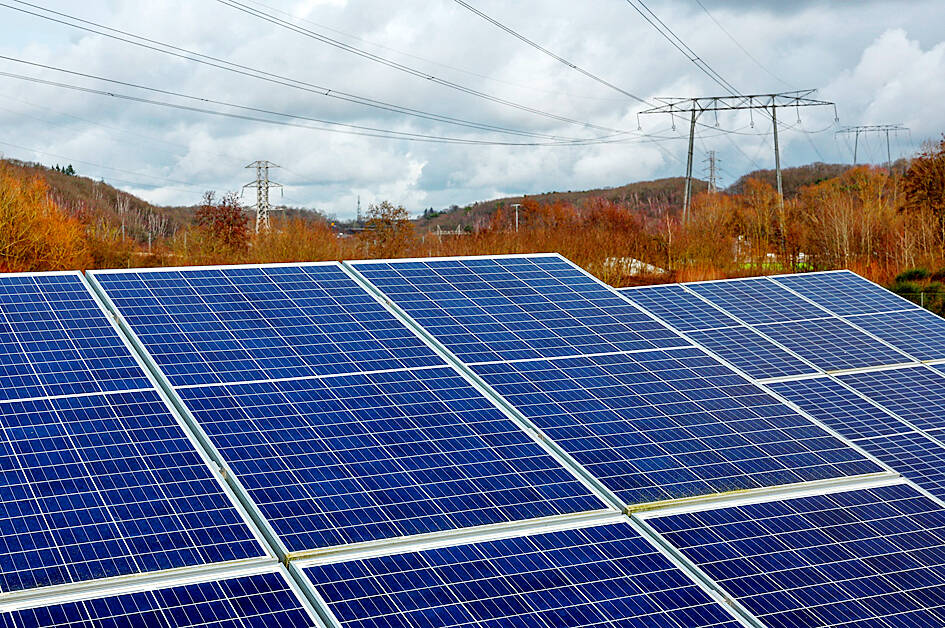Investment in clean energy technologies is set to strike a record this year, despite global economic uncertainty, while spending on fossil fuels is to dip for the first time since 2020, the International Energy Agency (IEA) said yesterday.
US President Donald Trump’s administration has been hostile to renewable energy sources and trumpets boosting oil production, but the IEA said security concerns as well as rising demand for electricity — including from artificial intelligence (AI) and data centers — are driving investment in clean energy sources.
“Amid the geopolitical and economic uncertainties that are clouding the outlook for the energy world, we see energy security coming through as a key driver of the growth in global investment this year to a record US$3.3 trillion as countries and companies seek to insulate themselves from a wide range of risks,” IEA executive director Fatih Birol said, as the agency published its latest annual “World Energy Investment” report.

Photo: Reuters
The IEA expects investment in clean technologies, including nuclear and electricity distribution grids, to hit a record US$2.2 trillion this year, while investment in oil, natural gas and coal is set to dip to US$1.1 billion, as companies react to falling prices and lower demand expectations.
The IEA said the shift in US policies would impact investment there in renewables.
“Spending on renewables and low-emissions fuels in the United States almost doubled over the last 10 years, but is now set to level off as supportive policies are scaled back,” the agency said.
The rapid rise in electricity demand — for industry, cooling, electric mobility, data centers and AI — is expected to attract US$1.5 trillion in investments this year, 50 percent more than fossil fuels, the report found.
The IEA also noted that nuclear energy has been making a comeback as electricity demand from data centers risks doubling in the next five years. While renewables are expected to meet most of that additional demand, the steady supply that nuclear plants offer has prompted a number of tech companies to enter into supply agreements.
Despite the rising levels of investment in renewable energy production, the IEA said that it must double to achieve the goal set at last year’s UN climate conference — a tripling of installed renewable capacity by 2030.
Meanwhile, China and India have approved the construction of the largest capacity of new coal-fired power plants in a decade, as the world’s two most populous nations seek to bolster energy security, the IEA found.
China gave the green light to almost 100 gigawatts of new coal-fired plants last year, and India a further 15 gigawatts, pushing global approvals to their highest level since 2015, the agency said.
“Nearly all the growth in coal investments in 2024 came from China and India to meet domestic demand,” it said.
Additional reporting by Bloomberg

CAUTIOUS RECOVERY: While the manufacturing sector returned to growth amid the US-China trade truce, firms remain wary as uncertainty clouds the outlook, the CIER said The local manufacturing sector returned to expansion last month, as the official purchasing managers’ index (PMI) rose 2.1 points to 51.0, driven by a temporary easing in US-China trade tensions, the Chung-Hua Institution for Economic Research (CIER, 中華經濟研究院) said yesterday. The PMI gauges the health of the manufacturing industry, with readings above 50 indicating expansion and those below 50 signaling contraction. “Firms are not as pessimistic as they were in April, but they remain far from optimistic,” CIER president Lien Hsien-ming (連賢明) said at a news conference. The full impact of US tariff decisions is unlikely to become clear until later this month

With an approval rating of just two percent, Peruvian President Dina Boluarte might be the world’s most unpopular leader, according to pollsters. Protests greeted her rise to power 29 months ago, and have marked her entire term — joined by assorted scandals, investigations, controversies and a surge in gang violence. The 63-year-old is the target of a dozen probes, including for her alleged failure to declare gifts of luxury jewels and watches, a scandal inevitably dubbed “Rolexgate.” She is also under the microscope for a two-week undeclared absence for nose surgery — which she insists was medical, not cosmetic — and is

GROWING CONCERN: Some senior Trump administration officials opposed the UAE expansion over fears that another TSMC project could jeopardize its US investment Taiwan Semiconductor Manufacturing Co (TSMC, 台積電) is evaluating building an advanced production facility in the United Arab Emirates (UAE) and has discussed the possibility with officials in US President Donald Trump’s administration, people familiar with the matter said, in a potentially major bet on the Middle East that would only come to fruition with Washington’s approval. The company has had multiple meetings in the past few months with US Special Envoy to the Middle East Steve Witkoff and officials from MGX, an influential investment vehicle overseen by the UAE president’s brother, the people said. The conversations are a continuation of talks that

CHIP DUTIES: TSMC said it voiced its concerns to Washington about tariffs, telling the US commerce department that it wants ‘fair treatment’ to protect its competitiveness Taiwan Semiconductor Manufacturing Co (TSMC, 台積電) yesterday reiterated robust business prospects for this year as strong artificial intelligence (AI) chip demand from Nvidia Corp and other customers would absorb the impacts of US tariffs. “The impact of tariffs would be indirect, as the custom tax is the importers’ responsibility, not the exporters,” TSMC chairman and chief executive officer C.C. Wei (魏哲家) said at the chipmaker’s annual shareholders’ meeting in Hsinchu City. TSMC’s business could be affected if people become reluctant to buy electronics due to inflated prices, Wei said. In addition, the chipmaker has voiced its concern to the US Department of Commerce